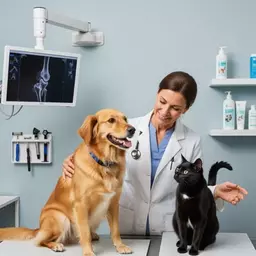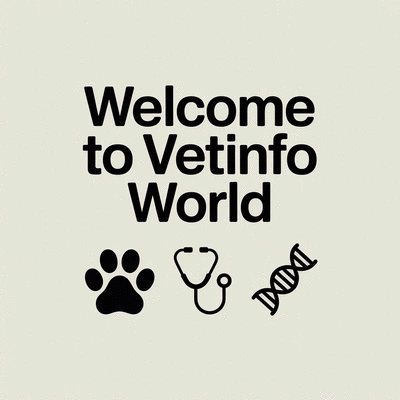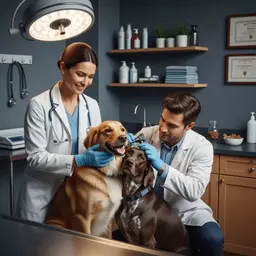Continuing education is not just a requirement; it’s an opportunity to grow and enhance the quality of care you provide to your clients. Embracing lifelong learning can significantly impact your practice and your patients' well-being!
What You Will Learn
- The importance of staying current with advancements in veterinary medicine for improved patient care.
- How continuing education fosters professional growth and enhances job satisfaction.
- The benefits of obtaining veterinary certifications to boost credibility and career advancement.
- Key aspects of Continuing Education Units (CEUs) and their role in maintaining licensure.
- Steps to finding the right continuing education resources tailored to your career goals.
- Ways to engage with the veterinary community for ongoing learning and networking opportunities.
- How to leverage resources like the Veterinary Information Network (VIN) for educational support.
Continuing Education Pillars for Veterinary Professionals
Continuing education is vital for career advancement and patient care in veterinary medicine. Key areas include regulatory updates, technological advancements, and community engagement. Staying informed about the latest veterinary medicine trends helps ensure you provide the best possible care.
Pillar 1 Keeping Up with Regulations & Standards
Ensures compliance and best practices in an evolving legal landscape.
Pillar 2 Learning About Emerging Technologies & Treatments
Integrates new diagnostic tools and innovative therapies for improved patient outcomes.
Pillar 3 Networking with Fellow Professionals
Fosters collaboration, knowledge sharing, and professional support within the community.
Pillar 4 Obtaining Veterinary Certifications
Boosts credibility, enhances expertise, and opens doors to specialized career paths.
Understanding the Importance of Continuing Education for Veterinary Professionals
As a veterinarian with over a decade in the field, I can confidently say that continuing education is vital for anyone looking to grow in their veterinary career. The world of animal health is constantly evolving, and staying informed about the latest advancements is essential for providing the best care possible. Whether you're a seasoned professional or just starting, embracing lifelong learning can significantly impact your practice and your patients' well-being.
Continuing education not only enhances your knowledge but also helps you stay connected with your peers in the veterinary community. It allows you to learn about new treatment options, diagnostic tools, and innovative practices that can improve patient outcomes. Think of it as an investment in both your career and the health of your furry patients!
The Role of Continuing Education in Veterinary Careers
Continuing education plays a crucial role in advancing veterinary careers. It fosters professional growth and ensures that veterinarians are equipped with the most current knowledge and skills. Some key aspects of continuing education include:
- Keeping up with regulations and standards in veterinary medicine.
- Learning about emerging technologies and treatments, including new veterinary diagnostic tools.
- Networking with fellow professionals to share insights and experiences.
By participating in ongoing education, veterinarians can enhance their expertise, leading to improved job satisfaction and career opportunities. I’ve found that the more I learn, the more confident I become in my abilities!
Benefits of Obtaining Veterinary Certifications
Obtaining veterinary certifications can significantly boost your professional credentials. Certifications not only demonstrate your commitment to the field but also highlight your expertise in specific areas. Here are some benefits of pursuing these credentials:
- Increased credibility among clients and colleagues.
- Enhanced career advancement opportunities.
- Access to specialized knowledge and resources.
As a veterinarian, I’ve seen firsthand how certifications can open doors and create new possibilities within the veterinary world. With so many options available, it’s worth exploring which certifications align with your interests.
Continuing Education Units (CEUs): What You Need to Know
CEUs are a critical component of continuing education for veterinary professionals. These units are used to quantify the time spent on educational activities and are often required for maintaining licensure. Here's what you need to know about CEUs:
- Most states require a specific number of CEUs for license renewal.
- CEUs can be earned through various activities, including workshops, online courses, and conferences.
- It's essential to choose accredited programs to ensure your CEUs are recognized by your licensing board.
Understanding CEUs is important for planning your education path. I recommend keeping track of your earned units, as this can help you stay organized and ensure you meet your state’s requirements.
Interactive Poll: Your Continuing Education Journey
As you consider your path in veterinary continuing education, we want to hear from you! What aspect of continuing education do you find most valuable?
Taking Action: Finding the Right Continuing Education Resources
As veterinary professionals, taking action towards your continuing education is vital for staying updated in our ever-evolving field. There are numerous resources available that can help you enhance your knowledge and skills while fitting into your busy schedule. Here’s how you can start your journey to find the right continuing education (CE) opportunities that align with your career goals. This also ties into anticipating 2025 pet wellness trends.
Next Steps for Veterinary Professionals Seeking CE Opportunities
First things first, it's essential to identify what areas of knowledge you want to expand. Consider these steps:
- Reflect on your interests and career goals.
- Research which topics are trending in veterinary medicine.
- Join local and online veterinary communities for recommendations.
- Review the licensing requirements for your state to ensure compliance.
By taking these steps, you can tailor your educational journey to meet both personal interests and professional requirements, paving the way for a rewarding career.
Engaging with the Veterinary Community for Ongoing Learning
Engagement with the veterinary community not only broadens your horizons but also fosters valuable connections. Here are a few ways to actively participate:
- Attend workshops and seminars hosted by veterinary associations.
- Join online forums and discussion groups related to veterinary science.
- Collaborate with fellow veterinarians on case studies or research.
- Participate in social media groups dedicated to veterinary professionals.
These connections can lead to insightful conversations and collaborative learning experiences, enhancing your education and growth as a veterinary professional.
Leveraging the Veterinary Information Network (VIN) for Resources
The Veterinary Information Network (VIN) is a fantastic resource for veterinary professionals. It provides access to:
- Webinars and online courses tailored for various specialties.
- A vast library of veterinary articles and case studies.
- A community of professionals for discussion and support.
By leveraging VIN, you not only gain access to valuable educational content but also connect with a supportive community that shares your passion for animal care.
Summary of Valuable Continuing Education Resources
As we wrap up this section on continuing education, let’s highlight some key takeaways to guide you:
- Identify your learning goals and interests.
- Engage with the veterinary community for insights and recommendations.
- Utilize platforms like VIN for a wide range of resources.
By prioritizing these steps, you can navigate the abundant options available and select the most enriching resources for your career. Remember, at VetInfo World, we’re committed to empowering you with the knowledge you need to excel in your veterinary practice!
Encouragement to Prioritize Continuing Education in Your Career
Continuing education is not just a requirement; it’s an opportunity to grow and enhance the quality of care you provide to your clients. I encourage you to embrace these resources and make lifelong learning a cornerstone of your professional journey. After all, the more you learn, the better equipped you are to make a difference in the lives of the animals you care for!
Frequently Asked Questions about Veterinary Continuing Education
- Q: Why is continuing education important for veterinary professionals?
- A: Continuing education is vital for staying updated with the latest advancements in veterinary medicine, improving patient care, fostering professional growth, and maintaining licensure.
- Q: What are CEUs, and why are they necessary?
- A: CEUs (Continuing Education Units) quantify time spent on educational activities. They are often required by state licensing boards for veterinarians to renew their licenses, ensuring professionals remain competent and current in their field.
- Q: How can veterinary certifications benefit my career?
- A: Certifications boost credibility, demonstrate expertise in specific areas, enhance career advancement opportunities, and provide access to specialized knowledge and resources.
- Q: What are some ways to find relevant continuing education opportunities?
- A: You can find opportunities by reflecting on your career goals, researching trending topics in veterinary medicine, joining local and online veterinary communities, and reviewing your state's licensing requirements. Platforms like the Veterinary Information Network (VIN) also offer extensive resources.
- Q: How can engaging with the veterinary community help with ongoing learning?
- A: Community engagement fosters collaboration, knowledge sharing, and professional support. Attending workshops, joining online forums, and networking with peers can lead to insightful conversations and collaborative learning experiences.
Recap of Key Points
Here is a quick recap of the important points discussed in the article:
- Continuing education is essential for veterinary professionals to stay informed about advancements in animal health.
- Obtaining veterinary certifications can enhance credibility and career opportunities.
- CEUs are crucial for maintaining licensure and should be earned through accredited programs.
- Engaging with the veterinary community fosters valuable connections and learning opportunities.
- Utilizing resources like the Veterinary Information Network (VIN) can provide access to specialized knowledge and support.









